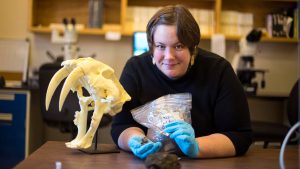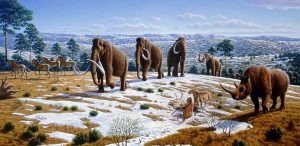August 29, 2019
Women’s Equality Day Q&A with Jacquelyn Gill
Posted by Caitlin Bergstrom

August 26th is Women’s Equality Day. To celebrate women’s contributions to Earth and space science, we’re devoting this week to featuring Q&As with inspirational women in STEM. #WomensEqualityDay!
Today, we’re excited to feature Jacquelyn Gill, Assistant Professor of Paleoecology & Plant Ecology at the University of Maine. Jacquelyn received her PhD in Geography at the University of Wisconsin-Madison and her BA in Human Ecology at College of the Atlantic. Find Jacquelyn on Twitter, @JacquelynGill, check out her blog, and catch her co-hosted podcast, Warm Regards.
What inspired you to become a scientist?
I started at the “little hippy college in the woods,” Goddard college, but they closed their campus program when I was two years into school. I ended up transferring to College of the Atlantic, the “little hippy college by the sea,” and I didn’t know what I wanted to do or who I wanted to be. Conservation biology really hooked me because I felt like a lot of the assumptions we have about the natural world weren’t necessarily informed by the dynamic landscapes that I had grown up with here in New England, landscapes that have the heavy fingerprint of the glaciers and the last ice age and forest abandonment after European land clearing. I felt like our lack of appreciation for dynamism in nature was causing us to have flawed conclusions in both ecology and conservation. That for me was when I realized I wanted to study the earth and how it changes through time, and I wanted to use that information to help us understand ecosystems today.
In what ways do you engage the general public/non-scientists with your research?
I’ve really enjoyed playing in the science communication/outreach/engagement landscape. Sometimes that involves talking to foresters about the long view of forests and climate change or talking with kids about the Ice Age. I have a podcast where we try to reach as much of a non-science and non-policy audience as possible, I’m on social media, and I’ll talk to reporters about my work—mammoths are a great natural hook. It’s been great to try to different things and feel out what I like, what I’m good at, what I don’t enjoy.
When people are interested in taking on science communication, I tell them to play and to try things. Try to figure out what you enjoy and what you’re good at or, if you’re not good at something, what you wouldn’t mind getting better at because you like it.
What advice would you give to those aspiring to work in science?
There is so much information out there about how you should dress, what classes you should take, what skills you should get, what you should and shouldn’t say, whether you should be on the internet or not, what you should look like, and I would just say: throw that all out the window. The better way to think about it is: how receptive are people to you and your kind of science, what barriers will you face based on your background and your identity, and what can you do to mitigate that? Obviously, it’s one thing to say dress how you want, it’s another thing to also be aware of the realities that we face. For example, as women or as person of color, you’re just going to run against biases about what scientists should and shouldn’t look like. So, trust your gut and follow your instincts, do what you can to control what’s in your control, but don’t feel like you have to let go of who you are to be successful scientist.
What do you think Earth/space science research should prioritize in the future?
I think the first thing we need to do is make sure we have a diversity of voices in the room, we need to have active efforts to improve inclusion. If those people are in the room but they’re not heard, that’s not inclusion, that’s not equity. The spaces where we are deciding the future of science, the spaces where research agendas are being set, where science is being communicated, those spaces need to be diverse, inclusive, accessible, and equitable. Until and unless that happens, we are not going to be doing science at our best. Especially in Earth science, which still faces tremendous barriers in terms of gender and racial diversity. We are missing out on so many important perspectives and ways of knowing. So, I think before we can even set the agenda, we need to make sure that we are hearing all voices.
What discovery do you hope to see in your lifetime?
When I approach this question, I have gut responses, but then there’s all the caveats. There’s still a child-like part of me that wants to see a transgenic wooly mammoth, but at the same time there’s so many problems with that. I have this gut response of “this this this and this” and then my rational brain takes over.
This is a hard question to answer because you have to zoom out of yourself and think about the bigger picture. Even though I feel compelled to give you answers about my own field, I would rather have a cure for cancer than a transgenic mammoth… but at the same time it would be super cool to know about life on other planets!


